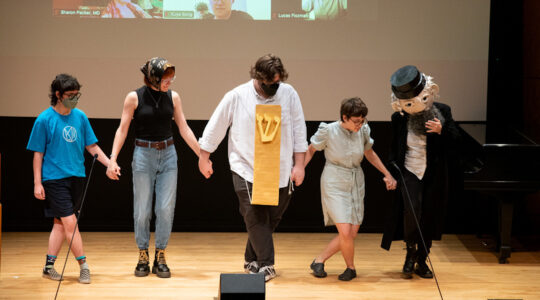The Weekly Standard and the Forward each rummage through the baggage of the newly (re)named top Middle East peace envoy Martin Indyk.
The Forward’s Nathan Guttman notes that Indyk, who held a similar post during the Clinton administration, has pissed off folks all over the map. The Standards’s Noah Pollak unearths evidence that he’s flattered folks all over the map.
Take your pick: Guttman’s man with the right kind of baggage, or Pollak’s failed careerist. Flatter one guy, you’re gonna piss off another.
One quibble with Pollak: He suggests Dennis Ross got a first-term Obama job because he backed Obama while Indyk was frozen out because he backed the wrong horse. But Ross did not back Obama until Clinton conceded and made it a point not to back anyone in the Democratic primaries in 2008. He acknowledged to me at the time that there was a perception that he was backing Clinton only because Clinton’s people took up his standing offer for consultations more frequently than Obama’s.
Indyk was an analyst at Australian National University in Canberra in the 1970s when he met Steve Rosen, who was then a visiting professor at ANU and later the research director at AIPAC. Indyk became Rosen’s deputy at AIPAC in 1982 and founded the Washington Institute for Near East Policy a few years later. (I was in Canberra a couple of weekends in the early 80s. It was the kind of town that could easily drive you to become a deputy research director at a Washington lobby.)
A few years back, Rosen described for me the meeting that established Indyk’s government career. The Clintons, early in the 1992 primaries, were doing the rounds with interest groups, as all primary candidates do — especially governors, who want to know more about the national/international issues they would be expected to handle in the White House. Indyk was no longer at AIPAC, but Rosen chose him as his wingman.
A meeting that would typically run 20 minutes stretched on for hours as Rosen sat back (something he was not accustomed to doing) and watched the chemistry unfold between Indyk and the Clintons. The Clintons, Rosen said, had the type of blunt, right questions typical of people smart enough to realize they knew little about a tremendously complex subject. And Indyk loved it.
So what makes Martin run? He suggested a factor closer to home in his short remarks Monday, after Kerry made the announcement.
Fifteen years ago my son, Jacob, who was 13 at the time, designed a screensaver for my computer. It consisted of a simple question that flashed across the screen constantly: Dad, is there peace in the Middle East yet? I guess you could say, Mr. Secretary, that he was one of the original skeptics. (Laughter.) But behind that skepticism was also a yearning. And for 15 years, I’ve only been able to answer him, “Not yet.” Perhaps, Mr. Secretary, through your efforts and our support, we may yet be able to tell Jake, and more importantly, all those young Israelis and Palestinians who yearn for a different, better tomorrow, that this time, we actually made it.





